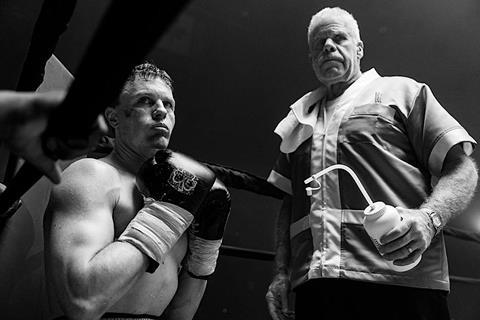Michael Pitt plays a middleweight boxer in the debut feature by his ’Boardwalk Empire’ co-star Jack Huston

Dir. Jack Huston. US. 2023. 108mins
Whatever you call it when a pugilist punches above their weight, Jack Huston’s debut feature Day of the Fight has it – at least when it comes to chutzpah. It is certainly some kind of nerve to make a boxing film that borrows both its title and its premise from the 1951 documentary short by Stanley Kubrick, which followed a boxer through one day leading up to a match. Huston’s film takes a similar tack, with an existential thrust – we are essentially seeing one man’s life in a single day, as Michael C. Pitt’s boxer seeks redemption both in the ring and in the New York he wanders through pre-showdown.
Something less than a resounding KO
Beautifully shot, impressively cast, and revolving round a charismatic lead from long-time US indie favourite Pitt, the film otherwise comes across as a derivative, solemn affair with a look that suggests a retro gloss finish on generic material. Prestige credits, including a rare sighting of the great Joe Pesci – plus the rep of Boardwalk Empire star Huston, making his directing debut – should win the film moderate exposure. But while it is clearly executed with ambition and directorial flair, it is something less than a resounding KO.
Filmed around Brooklyn, and set in New York in, apparently, the late 80s, Day Of The Fight follows middleweight boxer ‘Irish’ Mike Flanagan (Pitt) as he prepares for a comeback fight at Madison Square Garden after long years out of the ring. His absence is explained by the car crash that opens the film, in which a boy was killed and Mike sustained serious brain injuries. It also sent him to prison and ended his relationship with his wife Jessica (Nicolette Robinson) and their young daughter.
After training in the street and his bare apartment, Mike gears up for the evening’s fight by attempting to come to terms with people, alive and dead, from his past. Among them are his long-term trainer Stevie (Ron Perlman) and another mentor figure (Steve Buscemi); old pal turned priest Father Patrick Donnelly (a genial John Magaro, providing the film’s warmest and most relaxed duet with Pitt); and Jessica, who’s none too happy to see her ex but agrees to take a walk with him, as Mike pours his soul out in the film’s most rhetorically upfront sequence. As brief flashbacks to Mike’s sorrows zip before our eyes, he also checks in at a care home to see his elderly father, a former singer. This occasions a poignant, wordless cameo from Joe Pesci (also credited as an exec producer); when Mike puts on one of his dad’s records, the torchy ballad we hear is sung by Pesci himself, who in his time has enjoyed a sideline as a stylish crooner (Pesci also reappears in a last-minute scene that blows quite a bit of the film’s emotional credit).
Just as Mike’s life flashes before his eyes throughout, the viewer’s mind will constantly pick up echoes from other boxing-related movies: among them, inescapably, Raging Bull (although the culminating fight here does its best to distance itself, not least by incorporating a running voice-over commentary); On the Waterfront, with Mike a latter-day Terry Malloy, who coulda been a contender (whereas Mike once actually was); and indeed 1972’s Fat City by John Huston, revered grandfather to this film’s director.
Much in this film feels familiar although, for quite a while, Day Of The Fight holds off from absolute obviousness. The sequence with Magaro reproduces something of the Brando and Karl Malden dynamic from Waterfront, with laid-back joshing that makes for the best part of the film. Conversely, the reunion with Jessica verges on the lachrymose, despite strong presence from Robinson – and when Jessica, a lounge singer (what else?), gives a moody piano rendition of a Creedence Clearwater classic, the film crosses the frontier into pure corn, where it spends its final stretch.
There’s no denying that Day Of The Fight is visually stylish – but arguably too much so. Peter Simonite’s finely crafted black and white photography is always imposing yet with a beauty that feels as though it is masking the thinness of the drama. The gorgeous backlighting of characters’ heads garnishes them a little too liberally with mythic grace, while the chiaroscuro desolation of Mike’s flat suggests the location of a God’s-lonely-man lifestyle shoot. Musically, the film also lavishes the style a little obtrusively, although songs by Rodriguez, Jackson Frank and Labi Siffre appealingly enhance the period feel, and Ben McDiarmid’s melancholy score brings plangent hints of Irish folk lament.
The real heft of the film, however, lies in Michael Pitt’s performance. Almost unrecognisable from his days as a young art-house stalwart (Last Days, The Dreamers, et al), Huston’s Boardwalk Empire co-star here looks convincingly bulked up and battered by life, faintly resembling a shopsoiled version of 60s-era James Fox. He is knowingly riffing on the tender/tough archetype of so many old American movies, but he does it here with a candour, conviction and heart that the film does not entirely weigh up to.
Production companies: Cysa Films, Akrasia Films, Shrink Media, First Love Films
International sales: CAA Media Finance filmsales@caa.com
Producers: Josh Porter, Jack Huston, Jai Stefan, Emma Tillinger Koskoff, Colleen Camp
Screenplay: Jack Huston
Cinematography: Peter Simonite
Editor: Joe Klotz
Production design: Pete Zumba
Music: Ben MacDiarmid
Main cast: Michael C. Pitt, Nicolette Robinson, John Magaro, Steve Buscemi, Ron Perlman, Joe Pes






![The Brightest SunScreen[Courtesy HKIFF]](https://d1nslcd7m2225b.cloudfront.net/Pictures/274x183/3/5/0/1448350_thebrightestsunscreencourtesyhkiff_312678.jpg)















![The Brightest SunScreen[Courtesy HKIFF]](https://d1nslcd7m2225b.cloudfront.net/Pictures/100x67/3/5/0/1448350_thebrightestsunscreencourtesyhkiff_312678.jpg)

